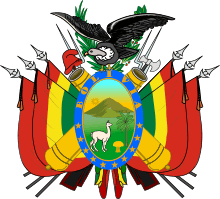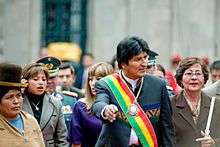Bolivia, officially the Plurinational State of Bolivia is a landlocked, developing country located in western-central South America. The capital is Sucre, while the seat of government and financial center is located in La Paz. The country's population, estimated at 11 million, is multi ethnic, including Amerindians, Mestizos, Europeans, Asians and Africans. Its main economic activities include agriculture, forestry, fishing, mining, and manufacturing goods such as textiles, clothing, refined metals, and refined petroleum. Bolivia is very rich in minerals, including tin, silver, and lithium.

Coat of arms of Bolivia
.jpg)
Bolivia has the world’s largest known lithium reserves

Bolivian President Evo Morales, a leftist and former coca farmer, is counting on lithium to serve as the economic engine that lifts his country out of poverty.
Quotes
- Broadly speaking, Evo Morales was a successful leader of Bolivia. A trade unionist with familial roots among the country’s indigenous peoples, he was first elected president in 2005 and was twice returned to office with substantial majorities. Morales is credited by the IMF with achieving a drastic reduction in poverty among farmers and coca growers and a societal revolution that, among other things, transformed the standing of Bolivia’s numerous ethnic minority groups.
- He championed a “plurinational” constitution that guaranteed equal rights and opportunities for all citizens, effectively ending the monopoly on power previously enjoyed by Bolivians of European descent. His time in office also saw a big increase in women’s political participation.
- The Observer view on Evo Morales and Bolivia, Observer editorial, The Guardian, (17 November 2019)
- The Venezuelan head of state President Nicolás Maduro also referred to the coup in Bolivia against the legitimate President Evo Morales, saying that "Evo is the only one who can restore the peace in Bolivia," in the face of the police repression unleashed by the Bolivian president's resignation. "The order to arrest Evo and to assassinate him was given to a paramilitary group in Santa Cruz and another in Potosi, it is the intelligence information that reached us," he said, adding that the coup was financed from Washington and organized at the U.S. embassy in La Paz.
- Venezuela: Maduro Denounces Bribery Attempts on Army Officers, TeleSUR (17 November 2019)
- At least eight people were killed and dozens injured in the Bolivian city of Sacaba on Friday, after security forces fired on supporters of ousted president Evo Morales, according to the Associated Press.
- With tensions running high following Morales' resignation last Sunday, demonstrators took to the streets to decry the nation's interim president, Jeanine Añez. The protesters, made up largely of members of Bolivia's indigenous population, view Añez's rule as illegitimate and are calling for Morales to return.
- Bolivia has a new US-backed puppet leader, and the Western media can hardly conceal their adulation. Jeanine Áñez declared herself “interim president” in a near-empty Senate chamber on November 12... Despite a lack of quorum rendering the move nakedly unconstitutional, Áñez was immediately recognized by the Trump administration and 10 Downing Street... like a parody of January’s events in Venezuela...
- In Bolivia, indigenous-led protests continued to rage in La Paz Thursday, after Bolivia’s self-proclaimed interim President Jeanine Áñez swore in a new Cabinet with no indigenous members. Áñez is a right-wing Christian who’s previously blasted indigenous communities as “Satanic” in tweets that she later deleted. She said Thursday that exiled socialist President Evo Morales — who fled to Mexico after he was deposed by the military Sunday — would not be allowed to compete in a new round of elections.
- Morales upended politics in this nation long ruled by light-skinned descendants of Europeans by reversing deep-rooted inequality. The economy grew strongly thanks to a boom in prices of commodities and he ushered through a new constitution that created a new Congress with seats reserved for Bolivia’s smaller indigenous groups while also allowing self-rule for all indigenous communities.
- Añez also faces a challenge to her legitimacy in Congress, where lawmakers loyal to Morales tried to hold new sessions that would undermine her claim to the presidency... Morales’ backers, who hold a two-thirds majority in Congress, boycotted the session that she called Tuesday night to formalize her claim to the presidency, preventing a quorum. She claimed power anyway, saying the constitution did not specifically require congressional approval.
- We want to be a democratic tool of inclusion and unity,” said the 52-year-old religious conservative, sitting at a table bearing a huge open Bible and crucifix. But the transitional cabinet initially sworn into office on Wednesday night did not include a single indigenous person, in a country where at least 40% of the population belongs to one of 36 indigenous groups.
- Bolivia president's initial indigenous-free cabinet heightens polarization, The Guardian, (14 November 2019)
- Bolivia’s key reserves are in lithium, which is essential for the electric car. Bolivia claims to have 70 percent of the world’s lithium reserves... Morales made it clear that any development of the lithium had to be done with Bolivia’s Comibol — its national mining company—and Yacimientos de Litio Bolivianos (YLB) — its national lithium company—as equal partners... Tesla (United States) and Pure Energy Minerals (Canada) both showed great interest in having a direct stake in Bolivian lithium. But they could not make a deal that would take into consideration the parameters set by the Morales government. Morales himself was a direct impediment to the takeover of the lithium fields by the non-Chinese transnational firms. He had to go.
- Vijay Prashad in The Bolivian Coup Comes Down to One Precious Mineral, TruthDig, (13 November 2019)
- Camacho also hails from a family of corporate elites who have long profited from Bolivia’s plentiful natural gas reserves... his family lost part of its wealth when Morales nationalized the nation’s resources, in order to fund his vast social programs — which cut poverty by 42 percent and extreme poverty by 60 percent.
- Hours after the swearing-in ceremony, a New York Times reporter watched about 20 motorbike-riding civilians armed with metal pipes and chains travel out of Cochabamba’s main police station, as police officers saluted them and gave thumbs up on the way out. The riders did not carry any political affiliation, but Cochabamba’s Police Headquarters had flipped its allegiance to the opposition last Saturday, triggering a national wave of police mutiny that brought Ms. Añez to power.
- Clifford Krauss, in ‘I Assume the Presidency’: Bolivia Lawmaker Declares Herself Leader, The New York Times, (12 November 2019)
- On Monday, as looting and violence spread across several cities, Ms. Añez at first appeared rattled, sobbing as she called for calm. But by the evening, she was projecting strength, and demanding that the army accept the national police’s call to jointly patrol the streets of La Paz to restore order.
- Clifford Krauss, in ‘I Assume the Presidency’: Bolivia Lawmaker Declares Herself Leader, The New York Times, (12 November 2019)
- The Sunday military coup in Bolivia has put in place a government which appears likely to reverse a decision by just-resigned President Evo Morales to cancel an agreement with a German company for developing lithium deposits in the Latin American country for batteries like those in electric cars.
- Bolivian Coup Comes Less Than a Week After Morales Stopped Multinational Firm's Lithium Deal, Common Dreams, Eoin Higgins, staff writer (11 November 2019)
- State company Yacimientos de Litio Bolivianos (YLB), established by the government of President Evo Morales in 2008 to exploit lithium in the salt flats, aims to make Bolivia the fourth-largest producer by 2021. Morales, a leftist and former coca farmer, is counting on lithium to serve as the economic engine that lifts his country out of poverty.
- Bolivia, with huge untapped reserves, gears up for soaring lithium demand, France 24 (15 September 2019)
See also
External links
This article is issued from
Wikiquote.
The text is licensed under Creative
Commons - Attribution - Sharealike.
Additional terms may apply for the media files.